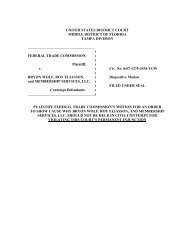Marketing Food to Children and Adolescents - Federal Trade ...
Marketing Food to Children and Adolescents - Federal Trade ...
Marketing Food to Children and Adolescents - Federal Trade ...
Create successful ePaper yourself
Turn your PDF publications into a flip-book with our unique Google optimized e-Paper software.
<strong>Marketing</strong> <strong>Food</strong> <strong>to</strong> <strong>Children</strong> <strong>and</strong> <strong>Adolescents</strong><br />
effect on or after January 1, 2006. The Special Order also requested information regarding<br />
company initiatives <strong>to</strong> promote healthy eating, such as product reformulation, packaging <strong>to</strong><br />
make nutritious <strong>and</strong> lower calorie products appealing <strong>to</strong> children or adolescents, nutritional<br />
icon or seal programs, efforts <strong>to</strong> improve the nutritional profile of foods marketed <strong>to</strong> children<br />
<strong>and</strong> adolescents, public education efforts regarding nutritional issues, <strong>and</strong> efforts <strong>to</strong> improve<br />
the nutritional profile of products sold in the schools. Section IV of the Report presents the<br />
information received in response <strong>to</strong> this part of the request.<br />
C. Role of the FTC Study<br />
The data presented in this Report represent a substantial majority of expenditures <strong>and</strong><br />
promotional activities in the marketing of food <strong>and</strong> beverage products <strong>to</strong> children <strong>and</strong> teenagers<br />
during 2006. The study does not represent the entire universe of such marketing. However, the<br />
Commission believes that it received data from a sufficient percentage of marketers <strong>to</strong> afford<br />
an accurate picture of food marketing <strong>to</strong> American youth between the ages of 2 <strong>and</strong> 17 years<br />
old. The Commission recognizes that some companies believe the Special Order required over-<br />
reporting of expenditures in certain promotional categories. 19 It is also true that there was under-<br />
reporting in some categories. 20 The Commission recognizes that the companies included in the<br />
study were asked, in some instances, <strong>to</strong> provide information they do not normally compile in<br />
the manner requested <strong>and</strong> that they may have had <strong>to</strong> re-structure their usual accounting methods<br />
<strong>to</strong> comply with the Special Order. The Commission believes the companies were thorough <strong>and</strong><br />
conscientious in preparing their responses, <strong>and</strong> it appreciates that effort.<br />
Because childhood obesity is a complex problem, with many social <strong>and</strong> economic<br />
contributing fac<strong>to</strong>rs, the Commission believes that all segments of society – parents, schools,<br />
government, health care professionals, food companies, <strong>and</strong> the media – have an obligation <strong>to</strong><br />
contribute <strong>to</strong> finding <strong>and</strong> implementing solutions. This Report – with its detailed assessments<br />
of the kinds of foods being marketed <strong>to</strong> children <strong>and</strong> adolescents <strong>and</strong> how these foods are being<br />
marketed – informs one aspect of the ongoing dialogue about how <strong>to</strong> address the problem.<br />
Participants in the 2005 Workshop generally agreed that, regardless of the causes of childhood<br />
obesity, food <strong>and</strong> beverage marketers can employ a wide range of strategies <strong>to</strong> play a positive<br />
role in reversing the trend. Participants also recognized that consumers expect the industry <strong>to</strong><br />
help both adults <strong>and</strong> children improve their diets by providing more healthy choices <strong>and</strong> helpful<br />
nutrition information, <strong>and</strong> by engaging in responsible marketing practices. 21<br />
Based on this study, the Commission has developed a series of recommendations for future<br />
action by members of the food industry, the media <strong>and</strong> entertainment industries, <strong>and</strong> others.These<br />
recommendations are set forth in Sections IV <strong>and</strong> V of the Report.<br />
6

















